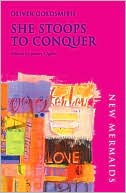

 |

|

The average rating for She Stoops to Conquer based on 2 reviews is 3.5 stars.
Review # 1 was written on 2014-08-05 00:00:00 Katie Smith Katie SmithThis play is really unique because even though it uses 18th century language, it's pretty easy to understand, and really funny! I didn't think I'd actually laugh out loud, but I did! Some parts needed reading twice to understand, but that was fine. A very enjoyable read! |
Review # 2 was written on 2017-07-24 00:00:00 Michael Gaeta Michael GaetaA Question of Class 24 July 2017 What is it with romantic comedies? I grab a book from a second hand bookshop containing some comedies from times past, and of the fours, plays three of them are romantic comedies. Okay, the other compilation of comedies that I had was a little better, but with regards to this collection I'm sort of a little disappointed that the only comedy that I can appreciate (namely isn't some comedy of errors surrounding mistaken identities between lovers) is a play by Ben Jonson. Well, maybe we have Shakespeare to thank since pretty much all of his comedies generally fall into that category (and some of them are pretty sickening when I think about it). You've probably guessed by now that I'm not one for romantic comedies. I'd have to say that I'm more of a Lock, Stock, and Two Smoking Barrels type of guy than, say, Pretty Woman or some such. Okay, there are some romantic comedies out there that I have liked, such as Eternal Sunshine of the Spotless Mind, but then I really didn't particularly find that funny, which is another thing: why is it that when you have a film that is basically a romance you have to throw the word comedy next to it even though there isn't actually one funny line in the entire script? So, that brings us to the story of She Stoops to Conquer. Okay, sure, it's a romantic comedy, but at least it is clever in its construction and simply doesn't fall into the category of boy meets girl, boy looses girl, and boy gets girl back and everybody dances off and gets married and sing happy songs while Malvolio ends up rotting in a pit somewhere. Okay, everything does end up working out well in the end, but I'd hardly call it a spoiler since we pretty much are expecting that the moment we sit in our seats with a bottle of craft beer and the curtain rises for the act, with one exception - this play actually isn't performed all that much, or at least where I tend to drift about. Then again, I suspect that maybe I wouldn't be rushing out to actually see this play in a hurry, namely because it is a romantic comedy and they really don't do all that much for me. Well, let us consider this one though - our hero has this problem in that he simply is not able to communicate with high class girls, so he ends up going after lower class women such as maids. However, there is a young lady that is interested in him, so to grab his attention she pretends to be a maid, only to discover that the world of the lower classes is pretty horrifying to a woman from a high-born social group. This I can easily understand, particularly when it comes to me intermingling with Christians (and I'm not talking about those over zealous, fundamentalist Christians either, I'm talking about average middle class people who happen to be Christian). The thing is that like it or not our world is divided into various social classes, and while we might pretend that we live in this so called classless society, in reality we don't. For instance bankers and bricklayers simply do not mix, nor do fashion designers and engineers - while they may not necessarily be of a different class in the sense of aristocratic or working class, they still exist in a class of their own, which brings me to the point with regards to Christians - most of them are university educated middle class people. Okay, I'm technically middle class, and I'm also university educated, but I come from a vastly different background to what many of them have come from. In fact I remember when I was in university most of them simply hung around in their own little clique, and rarely stepped outside of it to actually see what was going on. I didn't stay within the clique - I ended up walking out of it into a completely different social group, and saw and did things that would make people's head spin (unless of course you were in a similar group). Yet, when I wandered back I discovered something quite surprising - they were economically and politically conservative, and I was completely the opposite. In fact most of the people in the finance industry are economically conservative, which is probably why I don't really mix all that well. It seems as if I, as usual, have drifted far away from the original premise of this play, but then again I probably haven't. In a way it has some similarities to the first part of Henry IV, though I don't think anybody was actually chasing young Harry around the inn, it is just that, like our hero in this play, young Harry finds himself associating with people not really of his class. |
CAN'T FIND WHAT YOU'RE LOOKING FOR? CLICK HERE!!!